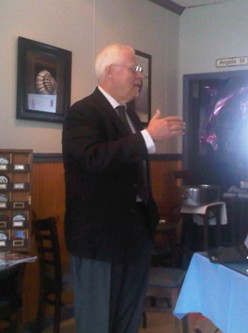Pledge: Pres. Paul Moore
Prayer: Pres. Paul Moore
Song: Bill McLaughlin
Brents Card Game Winner: Keith Wescovich
Sergeants Report: Rick Beck
Raffle Winners: Steve Mecca, Marty Drobiarz
Happy Bucks: Lots for Bob Antoniac who is home and improving.
Announcements:
Paul: October 16 is the earliest the Pavilion, our regular meeting place, will be open again and that isn't sure. For now, we are very grateful for Mark and Angela for having us meet in their restaurant JAMSS. Some alternative meeting places were discussed.
Marty: Bob Antoniac is home and doing much better now. New cast, new meds and recovering at home has done the trick!
Dave: Ron Scott is still at Apple Health Care. Our thoughts and hopes for his recovery is with him and his family.
Stan: The Outreach Committee will meet following the regular meeting.
Program: John Donnelly introduced the guest speaker, Steve Mecca
Steve is a Rotarian from Rhode Island and professor at Providence College. Steve has been involved in Rotary Internation projects in Africa for a long time, working to improve the educational system. He has been and is still involved in setting up libraries. To date, 23,000 books and 54 computers have been organized and sent to Ghana. Today's program was about the conditions that exist in Ghana in terms of sanitation and its impact on education and every day life where there is no basic plumbing or sewage systems. This has a huge impact on children, particularly girls, in their formative years.
In a place where potable water is scarce, toilets and sanitation systems as we know it, cannot exist for large populations. A toilet flush wastes 30 liters per person per day. Steve talked about a your girl named Ester. Thanks to the RI Polio Plus program, its safe to say she will not contract Polio. However, other diseases including malaria is likely to occur. Because there is only 1 doctor per 100,000 people in Ghana, Ester may never see a doctor in her lifetime. There are no toilets, people use plastic containers which are emptied in designated streams. The statistics are dire - 123 children out of 100,000 will die before they reach age 5 yrs due to poor sanitation. Money spent on this returns more than most other projects per dollar spent including clean water projects.
Currently, toilets consist of open trenches with a couple of boards and open defication. People, mostly wormen, line up early in the morning and can become victim of assault. Its been noticed that attendence in school for girls is lower than boys and a study shows that this is due to their needs relating to menstruation. In this culture, women are responsible for gathering the daily supply of drinking water for the family and that can take up to 2 hours. The economic impact of lack of proper facilities is huge, there is much sickness related to poor hygiene.
Whats being done:
There is new technology, biofilters and aerobic digesters that rapidly separate liquid from solids with a microflush. Rain water is collected to wash hands. The microflush-biofil toilet leaves a compost that is collected and disposed of and water is preserved. A family can buy a toilet through special loans at a cost of $0.70 - $1.50 per month. Prototypes are being deployed under a grant by the Gates Foundation. Five-stall units are being supplied to schools and there is no odor and no flies. The goal is to eliminate open defication. Children have fewer symptoms such as stomach aches. The problem now is production - its too low to fulfill the huge demand. Transporting units is expensive so a way to produce these toilets in population centers eliminating transportation costs is needed. Rotary can help and thanks to people like Steve, the quality of life of thousands of people can be greatly improved.
md

